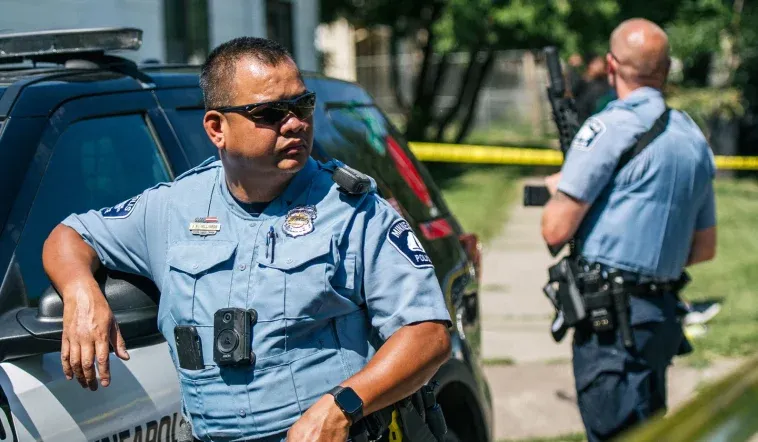(National Review) Jesse Spitzer was taken into custody in late January after leading law enforcement on a chase through the Northwest United States.
Spitzer was originally wanted in Snohomish County, Wash. on burglary, assault, and stolen-vehicle charges. Subsequently, neighboring Chelan County tacked on their own burglary and theft charges. After several days of trying to track him down, and several more incidents, Spitzer made his way into Idaho. Finally, after firing on officers on two separate instances as they pursued him, Spitzer was apprehended in Montana.
That’s because in July 2021, House Bill 1054 took effect in the Evergreen State after being passed by the Democratic state legislature and signed by the Democratic governor over the objections of Burnett and state law-enforcement associations.
Before they can pursue a vehicle, the new law requires that officers ensure that four conditions have been met: (1) An officer must have either a reasonable suspicion a driver is impaired due to drugs or alcohol, or probable cause to believe that he has committed certain kinds of violent crimes or sex crimes; (2) pursuit must be necessary to identify or apprehend the suspect; (3) the driver must be an imminent threat to the safety of others such that the risks of not pursuing him outweigh the risks of pursuit; and (4) a supervisor has authorized pursuit.
Burnett told National Review that these restrictions represent a threat to public safety. Anecdotally, that’s evidenced by Spitzer’s sojourn across the region and, statistically, it’s backed up by the data. Prior to HB 1054’s taking effect, the state recorded, on average, around 2,000 stolen vehicles per month. Since its passage, that figure has soared, reaching heights in excess of 4,000 per month.
“What we’re seeing on an average daily basis — whether it’s our jurisdiction or one of our neighboring jurisdictions — is there’s people that don’t stop for us all day long,” said Burnett. “It can be anything from a stolen vehicle, to somebody that we have probable cause on, or just a basic traffic stop, and, you know, next thing on it’s pedal to the metal and they’re off and running,” he continued.
Burnett and his fellow law-enforcement officials had foreseen these issues and lobbied against the bill, but he said lawmakers refused to take their concerns seriously.
“The response early on — because we have a Democratic-controlled Senate and House, and it’s a fairly large margin there — it was almost to the point of, I’ll call it arrogance,” remembered Burnett. The message the legislature sent to the Washington Association of Sheriffs and Police Chiefs was: “We don’t need you, we don’t need your opinion,” he added. “We were begging them and telling them and giving them reasons why: ‘Please don’t do this, it’s bad, bad policy,’” he said, but they ignored the pleas, because their majorities (57–41 in the House and 28–21 in the Senate) empower them to impose their will without compromise. But public opinion will probably assert itself eventually, given that crime is surging in the state: Washington set records for homicides in 2020 and then again 2021.
The majority’s lack of interest in the subject-matter expertise of police was further confirmed by Democrats’ banning of certain essential tools — including less and non-lethal ones — formerly at law enforcement’s disposal.
“They banned anything 50-caliber or larger. Well they didn’t take into account that a 12-gauge shotgun is actually larger than a 50 caliber. And then we have 40-millimeter launchers that are gas launchers for SWAT. . . . They use those 50-millimeter launchers to put pepper spray and gas into buildings to get a suspect to come out,” explained Burnett.
For several months, police officers in Washington were forced to take the launchers out of their arsenal, although the legislature was later convinced to go back and remedy the mistake on this particular front.
“They don’t know the impact, they don’t know the logistics, they don’t know the background because they have no training on law enforcement,” explained Burnett. The sheriff said that while Republican legislators reach out often and are more than receptive to law enforcement’s perspective, there’s only so much that can be done without a more sympathetic majority in the legislature. If change is going to come, it has to be bottom-up.
“We need our citizens to rise up,” Burnett said.
Rising Up
The crime wave isn’t the equal-opportunity result of Covid-era disruptions; it’s cropping up in a particularly bad way in liberal jurisdictions that have wholeheartedly embraced progressive criminal-justice reforms. And the backlash that Burnett is hoping for has already begun in those jurisdictions. In Nevada, for example, the sheriff of the state’s largest county is the Republican nominee for governor. Clark County’s top law-enforcement official since 2015, Joe Lombardo has a chance to unseat incumbent Steve Sisolak in no small part thanks to his tough-on-crime bona fides.
According to one recent poll, Nevadan Latinos say crime is the second most important issue to them as the November midterms approach, behind only inflation and in front of the economy more generally — a critical finding, considering they make up close to 20 percent of the electorate in the state and have historically been integral to Democratic victories there. And while most crime statistics have bounced around in the state over the last several years, Lombardo charged Sisolak and state Democrats with creating an environment where law enforcement is hamstrung, and criminals feel emboldened, citing numerous legislative examples.
“In 2019, Sisolak signed AB 236, which increased the felony-theft threshold from over $650 to $1,200. Sisolak then signed AB 440 . . . which requires police officers to issue citations in lieu of arrest for misdemeanor offenses with limited exceptions,” noted Lombardo in an interview with National Review. “So, just as an example of these failed policies, a criminal can now walk into a Nevada store, steal up to $1,199 of goods, and when police arrive, they can only issue a citation for a misdemeanor.”
“And let me tell you this: citations don’t change behavior,” he added.
The sheriff wasn’t finished enumerating his problems with AB 236, going on to call it “a disaster for our state.”
“AB 236 raised the felony threshold, lessened penalties for burglary, lessened sanctions for parole and probation violations, and limited the use of habitual criminal enhancements, which has had a devastating impact on crime,” he continued. “However, the most catastrophic provision in AB 236 was raising substance amounts required for drug-trafficking charges.”
The legislation raised the minimum threshold required to bring a low-level drug-trafficking charge from 4 grams to 100 grams, and the amount needed for a high-level drug-trafficking charge from 28 grams to 400 grams.
“By raising the substance amount so drastically, Sisolak has given drug dealers and traffickers a huge break and rewarded them for trafficking higher amounts,” said Lombardo. “Since 2019, trafficking charges with a weight of 100 grams or more have increased over 1,000 percent, and fentanyl deaths have sharply increased in Nevada.”
Five hundred and forty five Nevadans died as a result of drug overdoses in 2014, per the Centers for Disease Control. By 2020, that number had risen to 832.






